William Hemsworth's Blog, page 87
April 21, 2021
Music As Medicine With Deborah Keefe
https://www.podbean.com/media/share/pb-d6ggb-1013c37
Author Deborah Keefe joins me for today’s program. She is the author of the book “Canto Divina: Singing Psalms For Transformation”. We discuss the beginnings of the book, how music is medicine, and how music can lead us to a deeper relationship with Christ. Deborah presents her education, experience, and personal transformation through the music of our faith and supports this information with a summary of the history and science of music and medicine.
Check out the book at www.charispublishing.com or on Amazon.
The post Music As Medicine With Deborah Keefe appeared first on William Hemsworth.
Sacred Story Institute: Resources To Teach Children The Faith
I have been teaching children in my Parish’s religious education program for a few years now. It has been a blast and I plan on continuing in this ministry for many years. I am also the father of four children, and my twins, will be receiving first reconciliation and first communion in the next couple months. There are many resources out there for children, but recently I came across one from the Sacred Story Institute.
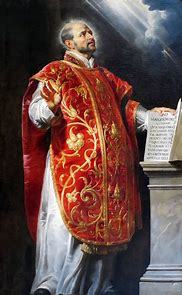
This resource is part of their Sacred Story Youth Program. Though there are programs for Pre-K thru 8th grade, I came only give my feedback on 2nd grade since that is the grade I am currently teaching.
Sacred Story Youth 2nd Grade ProgramAccording to the Sacred Story Institute this program is “designed to teach youth how to pray and understand spiritual discernment from Pre-K to Eighth Grade”. The 2nd grade program is geared toward teaching the children how to do a daily examination of conscience.
This is particularly good for this age group since getting in the habit of this will prepare them for the sacrament of reconciliation. It is also something that will help them with their spiritual life throughout the rest of their lifetime.
The theme for 2nd grade, and this might shock you, is memory. The prayer that goes along with this is the following:
Father I believe Jesus helps me remember everything that I have done or that has been done to me that has hurt my life of faith, hope and love.
Along with each lesson comes a three minute video that is available on Vimeo. Overall the lessons are fairly short and clock in at around 8 minutes. This was helpful with my children because it is a short daily lesson and keeps their attention. Let’s face it…kids don’t have the longest attention span. The Sacred Story Institute takes this into consideration.

The lessons also teach them about St. Ignatius of Loyola and introduces them to the Ignatian spiritual exercises. It is a great way to assist children to deepen their relationship with Jesus and his church. It teaches them lessons that they will take with them the rest of their life. I highly recommend this program if you teach 2nd graders.
About The Institute’s Program DevelopmentOur programs allow individuals to access the “archeology of their life history” to better understand what blocks integral human and spiritual development and how to navigate a graced path forward using the tools of spiritual discernment provided to the world and the Church by God through the genius of St. Ignatius’ conversion process.
*The above description is taken from https://sacredstory.net/
The post Sacred Story Institute: Resources To Teach Children The Faith appeared first on William Hemsworth.
April 20, 2021
4 Things Justin Martyr Can Teach Us About The Roman Empire
Justin Martyr is a saint that played a pivotal role in my conversion. It was through his work that I saw a glimpse of the ancient catholic liturgy. He lived in a time where being a Christian was illegal. These believers risked everything, including their lives, to become part of the church. Through his writing we can get a glimpse into some of the charges that the Roman Empire had against Christians. St. Justin addresses these charges in his First Apology.
1. Justin Martyr Answers The Charge Of AtheismThe Roman Empire had state sanctioned gods, to include the emperor, that were worshipped. Obviously, this is something that Christians could not do, as there is one God. For this, the Roman Empire called our ancestors in faith atheists, because they would not worship the roman gods.
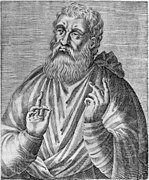 Justin Martyr
Justin MartyrSaint Justin writes, “Hence are we called atheists. And we confess that we are atheists, so far as gods of this sort are concerned, but not with respect to the most true God, the Father of righteousness and temperance and the other virtues, who is free from all impurity.”
2. On CannibalismThe charge of cannibalism was meant to be demeaning, and was a capital offense in second century Rome. The charge would go on to be used as proof of the historicity of Catholic teaching in modern day apologetics. The charge of cannibalism stems from Eucharistic language about Christians eating the flesh and drinking the blood of Christ. Without mentioning the Last Supper narratives or the Gospel of John chapter six he explains the Christian position.
Saint Justin writes, “For not by common bread nor common drink do we receive these: but since Jesus Christ our Savior was made incarnate by the word of God and had both flesh and blood for our salvation, so too, as we have been taught, the food that has been made into Eucharist by the Eucharistic prayer set down by him, and by the change of which our blood and flesh is nurtured, is both the flesh and the blood of that incarnated Jesus.”
3. Justin Martyr On IncestChristians in Justin’s time referred to each other as brother and sister, much like we still do today. We are related by faith, and adopted as children of God through the sacrament of baptism. Justin outright dismisses these charges as an insult, and told the emperor that the life of the Christian could be looked at as evidence to disprove this charge.
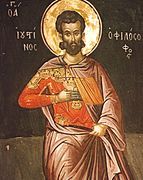
St. Justin writes, “And we think it for the advantage of all men that they are not restrained from learning these things, but are even urged thereto. For the restraint which human laws could not effect, the Word, inasmuch as He is divine, would have effected, had not the wicked demons, taking as their ally the lust of wickedness which is in every man, and which draws variously to all manner of vice, scattered many false and profane accusations, none of which attach to us.”
4. Conspiracy to Overthrow the StateAnother charge that was levied against the Christians is that of conspiracy to overthrow the government. These and other charges were exacerbated because Christians did not participate in everyday society. The popular events of the day such as politics and entertainment were intertwined with idolatrous acts, such as burning incense in homage of the emperor. Christians were trying to preserve their piety, lessen temptation, and stay safe during persecution. There assemblies were closed because only believers could partake in the Eucharist.
St. Justin states, “For if we looked for a human kingdom, we should also deny our Christ, that we might not be slain; and we should strive to escape detection, that we might obtain what we expect. But since our thoughts are not fixed on the present, we are not concerned when men cut us off; since also death is a debt which must at all events be paid.”
This article appears as my monthly contribution on www.epicpew.com.
The post 4 Things Justin Martyr Can Teach Us About The Roman Empire appeared first on William Hemsworth.
April 19, 2021
Purgatory: What It Is and What It Is Not
Catholic Answers apologist and author, Karlo Broussard, recently joined me for a discussion on purgatory. We discuss his new book “Purgatory Is For Real: Good News About The Afterlife For Those Who Aren’t Perfect Yet”.
Karlo Broussard Discusses PurgatoryKarlo discusses what Purgatory is and is not, aspects of the doctrine in other religions, aspects within Protestantism, and evidence from the early church. Karlo gives us enlightening information about this often misunderstood doctrine of the church. I highly recommend you check out the book at here.
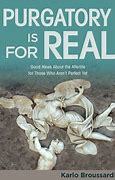 Karlo’s New BookAbout Karlo
Karlo’s New BookAbout KarloKarlo Broussard is a staff apologist and speaker for Catholic Answers. He travels the country giving talks on apologetics, biblical studies, theology, and philosophy, and is a regular guest on the radio program Catholic Answers Live. You can book Karlo for a speaking event by contacting Catholic Answers at 619-387-7200. You can also view Karlo’s videos at KarloBroussard.com. A native of Southern Louisiana, Karlo now resides in Southern California with his wife and five children.
The Interview About Karlo’s Book On PurgatoryThe post Purgatory: What It Is and What It Is Not appeared first on William Hemsworth.
April 16, 2021
It Is Right And Just: Dr. Scott Hahn Discusses His Book
I recently had the opportunity to sit down with Dr. Scott Hahn to discuss his new book titled “It Is Right And Just: Why The Future Of Civilization Depends On True Religion”. The book takes a look at the secularization of society and religion’s role.
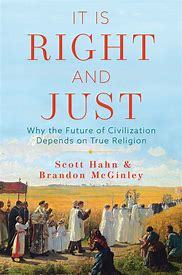
We discuss the call for all Catholics to evangelize and live their faith publicly, how some Catholics are suffering from “Stockholm Syndrome” in secular-liberal societies, and how man is a religious being by nature.
About Scott HahnDr. Scott Hahn is the Fr. Michael Scanlan Professor of Biblical Theology and the New Evangelization at the Franciscan University of Steubenville. He is the Founder and President of the St. Paul Center, an apostolate dedicated to teaching Catholics to read Scripture from the heart of the Church.
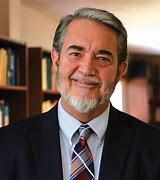
Dr. Hahn has been married to Kimberly for forty one years. They have six kids and twenty grandkids and two of their sons are currently in priestly formation with the Diocese of Steubenville. The author and editor of over forty popular and academic books, Dr. Hahn’s works include best-selling titles Rome Sweet Home, The Lamb’s Supper, and Hail Holy Queen. His most recent release is titled Hope to Die: The Christian Meaning of Death and the Resurrection of the Body and It is Right and Just: Why the Future of Civilization Depends on True Religion now available at StPaulCenter.com.
The Interview With Dr. HahnThe post It Is Right And Just: Dr. Scott Hahn Discusses His Book appeared first on William Hemsworth.
April 15, 2021
Veritatis Splendor And Double Effect
Over the course of our lives we will be faced with many difficult decisions. These decisions may be life altering and may change us forever. In the encyclical Veritatis Splendor, Saint Pope John Paul II writes, “Acting is morally good when the choices of freedom are in conformity with man’s true good and thus express the voluntary ordering of the person towards his ultimate end: God himself, the supreme good in whom man finds his full and perfect happiness”.
In these circumstances there are right and wrong moral decisions, and the principles of double effect and material cooperation assist us in making the right decision.
The principle of double effect, or PDE, has its origins with St. Thomas Aquinas. It is one of the best strategies in solving complex morality issues.
This principle states that it is possible to make a decision that has both good and bad effects. Just because it has both effects does not mean that it is not morally permitted.
There are conditions that must be met for a decision to fall under this principle. The act itself must be good or morally indifferent. The good effect must not come from evil. Evil is not the intended result.
If evil is the effect it should be a last resort and the good effect should be equal or greater. This principle, along with material cooperation, help to make the best moral decision out of possibly the worst of circumstances.
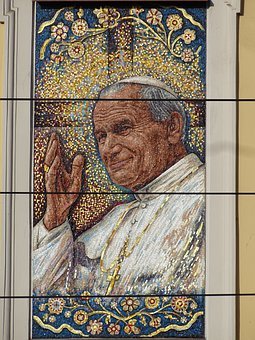 Material Cooperation In Veritatis Splendor
Material Cooperation In Veritatis SplendorWhen an individual assists in some way in wrongdoing this is called material cooperation, and there are two categories. The first is known as immediate material cooperation. This is when one disapproves of the act, but assists anyway.
The second in Mediate material cooperation, and consists of proximate mediate and remote mediate material cooperation. Proximate mediate is immoral in all cases. One example may be assisting in the production of Sarin gas. This doesn’t pass the morality test because that is used only for evil purposes.
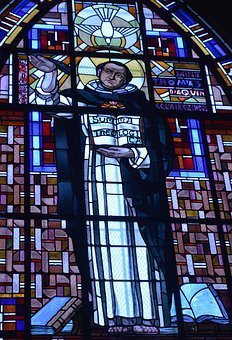
Remote mediate may be permitted based on the circumstance, such as not being able to find viable employment elsewhere and having to feed your children.
In this circumstance someone may be the janitor at the factory that produces Sarin gas because employment may not be had elsewhere. This is why moral decisions should be looked at to get all the factors.
Regarding this Pope John Paul II writes, “In this view, deliberate consent to certain kinds of behavior declared illicit by traditional moral theology would not imply an objective moral evil” (Veritatis Splendor para 75).
Valid Use of PDEA hard case when it comes to PDE is the subject of abortion. Abortion is the termination of a human life while it is still in the womb. Abortion being wrong is not a matter of just the church saying so. Numerous scientific studies claim that life begins at conception. This can be deduced by the use of reason without the aid of faith.
Imagine if a couple had six kids at home, and while pregnant with the seventh the mother is diagnosed with uterine cancer. Removing the cancer would end the pregnancy, but not removing it the mother will perish while the child lives. After much prayer and anguish the parents opt to remove the cancer. They do so for the benefit of the six children they have to raise.
This is an effective use of PDE since the intent was not to terminate the pregnancy, but to remove the cancer. Conversely a woman who chooses to terminate the pregnancy because she just does not want another child does not meet the conditions of PDE.
Proponents of proportionalism reject PDE because the moral actions of the individual should be judged by the consequences that ensue. In short, the outcome that brings the greatest good or the least bit of evil is the appropriate action.
Proportionalism does not have a set definition of what is morally upright. Therefore it can change based on the individual. It is because of these reasons that proportionalism is condemned by Veritatis Splendor.
The post Veritatis Splendor And Double Effect appeared first on William Hemsworth.
April 14, 2021
Parents…Teach Your Children
I have been called many things in my life: a good soldier, a solid worker, a model employee, and even a good husband. Those things are great and admirable, but they fail in comparison to my favorite title: dad. The Lord has blessed my wife and me with four awesome children, but with raising children goes much responsibility.
You are probably thinking that I’m stating the obvious. After all, as parents we have to feed, clothe, and provide shelter for our family. These are great responsibilities and should not be minimized, but there is another enormous responsibility not on the above list. As parents we are also called to catechize our children.
Catechizing Is Tough But As Parents We Must Do ItLet’s be honest about something: the Church is losing young people in droves. I was recently listening to the Word on Fire podcast, and in that episode Bishop Barron said that for every person that enters the Church there are six who leave.
Why would someone leave the truth? The answer is quite simple: they leave because they do not know what the truth is. A majority of those who leave the Church do so because they have not been taught what the Church believes, and their questions have not been answered.
There are always exceptions, but it comes down to catechesis. In my time as a catechist I have heard familiar comment from parents, “Teaching about the faith is your job. I don’t know where to begin.” The purpose of this article is to give some guidance on where to start. The parents are the primary educators of the faith. If you don’t take it seriously then chances are your children won’t either.
Teach Your Children About The MassThe first step in catechizing children is to take them to Mass. I had seventeen students in my first year as a catechist, and only six of them went to Mass on a weekly basis. The catechism calls parents the primary teachers of the faith, and this is also reiterated in scripture several times. Children look to us parents as an example, and if the Church is not important to us, it will very likely not be important to them either.
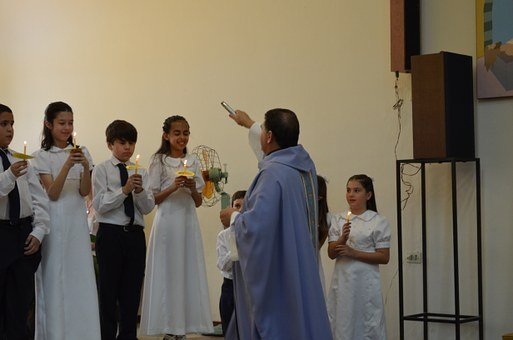
When you are at Mass, explain to your children what is going on. Tell them how much scripture the Mass contains, why the priest says what he does during the consecration, and how the Mass is a foretaste of the wedding supper of the Lamb that takes place in heaven while we offer Mass here below. There is no filler in Mass – everything is important. The more children know, the more they will become engaged.
We are living in an unprecedented time. Public Mass is currently suspended in most dioceses of the United States. Many priests and dioceses have taken it upon themselves to livestream their private Masses for our benefit. This is beneficial for all of us because the Mass is still happening. You can also find many of these Masses on YouTube, or you can record them from EWTN. This gives the added benefit of pausing to discuss the different aspects of the Mass.
Pray With Your ChildrenI have not always been very good at this step. I had the standard objections: “It’s too late” or “I’m too busy.” One evening I said good night to my son, and he said, “I would really like for you to pray with me before bed.” I learned something extremely important that night. Your children want you to pray with them. In doing so you become an example of what prayer is to them.

Is teaching prayer a priority or something you do in a passive way? If it is a priority for you then chances are it will be a priority for them too. In establishing a strong prayer life they, and we, understand more clearly just how much Christ loves us.
But remember that it is impossible to establish a strong relationship without dialogue. It is the same with prayer. There is no communion without dialogue. Prayer helps us establish a stronger bond with God, and that is something we desperately need to teach our children. We can talk about prayer until we are blue in the face, but there is no substitute for showing them how to do it. The more we show it, the more we’ll talk about its importance. As a result, our relationship with God will grow as will our relationship with our children.
In this uncertain time, ask your children if they have any prayer requests. They will chime in, and you can pray directly for their needs, their concerns, and those of their friends. You may also be surprised at what you learn about their lives when you do that.
Read Sacred Scripture With Your ChildrenReading scripture with our children may seem like a given, but we must ask ourselves if we are doing it enough. When I say read scripture, I mean picking up the bible and reading it. This isn’t to say that children’s bibles and picture bibles can’t play an important role, but they should be complementary resources.

This will help children develop a deep love and appreciation for sacred scripture. This, in turn, will lead to more questions about the faith that we can answer. This will show the biblical basis for the Catholic faith and will help them withstand those anti-Catholic objections that will come in the future. When answering these questions, it is also important to be honest. If our children ask a question we do not know the answer to, it’s important to admit that. Then research it and come back with an answer.
There is no better time than the present to strengthen our commitment to scripture reading. This will replace a part of the screen time most children are getting while school is out. Teach them that the scriptures are love letters from God; this will underscore how important they are to our faith.
ConclusionThese three items are only a few of the many things you can do to teach your children the faith in these crazy times. Take the time and make a plan. The faith doesn’t stop, and it is our responsibility as parents to pass it on. We are being forced to slow down, and that’s a good thing. Let’s take advantage of this opportunity to teach our children about Christ and His Church.
The post Parents…Teach Your Children appeared first on William Hemsworth.
April 13, 2021
St. Nick’s Journey: A Discussion With Keith Mayhew-Hammond
I recently had the opportunity to interview Catholic author Keith Mayhew-Hammond about his new book titled St. Nick’s Journey. He is the author of a great new book titled “St. Nick’s Journey: Suffering Souls Of Awahso”. We discuss the inspiration behind the book and what the characters represent. It is a great book that you need to check out.
St. Nick’s JourneyHere is the book description: Tom desperately tries to battle his doubts and fears about death, abandonment, and loneliness while struggling with Obsessive Compulsive Disorder, acute anxiety, and crippling depression. He writes prose and poetry in his journal as an attempt to cope. And he tries, unsuccessfully, to keep this internal conflict from becoming known to his family and friends by trying to keep up appearances. But the tiny thread keeping his hope alive inevitably snaps. And he becomes in desperate turmoil. Imagine if the glue that keeps everything dear to you comes loose, threatening your destruction.
Wouldn’t you desperately try all you could to put your life back together? When this happens to the young Obsessive-Compulsive Tom Jolmen, he clings to his last hope. Tormented by a shadowy presence, Tom runs away to find his Christmas hero, St Nicholas. Join him, his sports-loving brother, Nate, and their new-found companions: the conflicted Brendan and antagonistic Paul on their quest. The adventure goes amiss. But with the aid of their guardian angels this failed attempt helps resolve their doubts and strengthen their faith as they discover the real truth about themselves.
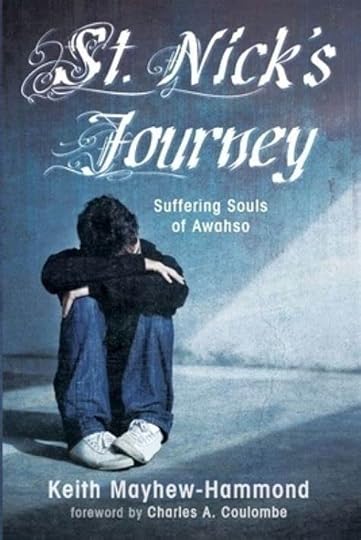
Check out the book at https://wipfandstock.com/9781725282827/st-nicks-journey/
Keith also has a great website at http://www.kmhbooks.ca/
About The AuthorKeith Mayhew-Hammond is a member of the Personal Ordinariate of the Chair of St. Peter (a Catholic ordinariate of Anglican Patrimony) and is a lector and altar server at Good Shepherd Church. He is also a proud member and cofounder of the Fraternal Society of Our Lady of Walsingham. Educated at Dr. F. J. Donevan Collegiate Institute, he served briefly in the Canadian Reserve with the Ontario Regiment. He was born and lives in Oshawa, Ontario, Canada.
The post St. Nick’s Journey: A Discussion With Keith Mayhew-Hammond appeared first on William Hemsworth.
April 12, 2021
Have We Taken The Eucharist For Granted?
Though we celebrate the liturgy of the Eucharist everyday at Mass, there is a tendency to get complacent. This seems to be our human nature, because if we do something enough we tend to go through the motions.
We have all been forced to take a step back and take a moment to remember what an awesome gift the Eucharist is. With this in mind I want to take a brief look and see what scripture and the early church tells us about the blessed sacrament.
The Eucharist Is BiblicalThough some terms for the Eucharist developed over time, the belief of what the Eucharist is has been around since New Testament times. Jesus gave a speech that we call the Bread of Life Discourse in which he says that unless we eat his flesh and drink his blood that we have no life within us (John 6:53). The synoptic Gospels of Matthew, Mark, and Luke give us the words of institution that we hear so often (Matthew 26:17-30, Mark 14:12-26, and Luke 22:7-39).
In Summary of these Jesus tells us to eat the bread and says “This is my body”. Then he took the cup of wine and “This is the cup of my blood that was given for you”. Notice how our Lord says “this is” and not that it is merely a symbolic action?
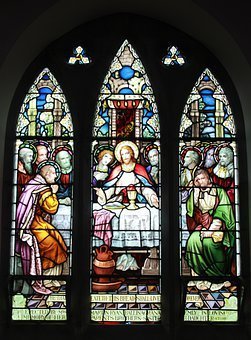 The Real Presence Was Believed By The Early Christians
The Real Presence Was Believed By The Early ChristiansThe real presence of Christ in the Eucharist is one that held true in the doctrine of the early church. The big heresy going around in the first couple centuries of the church was Gnosticism. The Gnostics believes that all matter was evil, and as such Jesus himself didn’t actually die on the cross.
Since all matter was deemed evil by the Gnostics, the Eucharist was something that was unfathomable? After all, if matter were evil, then there was no way that the bread and wine can transform into the body and blood of Christ.
The early church fathers understood the gnostic line of thinking and used the Eucharist as a way to refute them. In approximately 107 A.D. St. Ignatius of Antioch writes in his letter to the Smyrneans, “They [the Gnostics] abstain from the Eucharist and from prayer, because they confess not the Eucharist to be the flesh of our Saviour Jesus Christ, which suffered for our sins, and which the Father, of His goodness, raised up again”.
Justin Martyr, writing around 150 A.D., states that the bread and wine changes to the body and blood of Christ upon the prayer of the priest. In his great work titled Against Heresies, St. Irenaeus writes “the bread, which is produced from the earth, when it receives the invocation of God, is no longer common bread, but the Eucharist.”
There are many other such quotes like this span for several centuries. One such quote comes from St. John Chrysostom who died in 407 A.D. Describing the Eucharist the great saint states, “How many of you say: I should like to see His face, His garments, His shoes. You do see Him, you touch Him, you eat Him. He gives Himself to you, not only that you may see Him, but also to be your food and nourishment.”
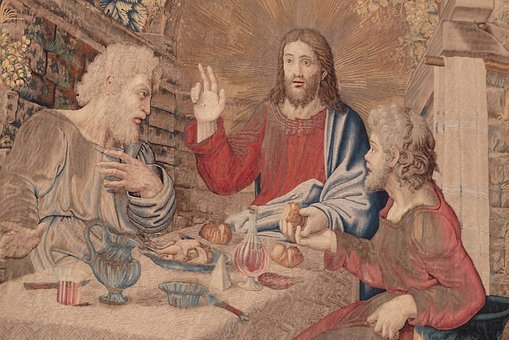 We Have Taken It For Granted
We Have Taken It For GrantedThese quotes go on and on, and through them we see that the teaching of the church from the beginning is that the Eucharist is the body and blood of Christ. At this point you are probably wondering why I am quoting all these great saints. Friends, my heart hurts.
For every one person that enters the Catholic church, there are six people who leave. Why would they leave such a great gift such as the Eucharist? When I ask those that leave, their answers range from the sexual abuse scandal to a disagreement with a priest.
However, a majority that I have spoken to leave because they do not believe what the church teaches about the Eucharist. Some didn’t even know the church’s teaching.
Perhaps we have taken this great sacrament for granted and our actions no longer show the reverence it deserves? Perhaps some have just been poorly catechized? Maybe it is both.
Reflect On This Great MysteryI urge you my friends to take a moment to reflect on the greatness that is the Eucharist. Especially if we had not partaken of it in a while. The very gift of himself that our Lord gives us to nourish and strengthen us. May we never take it for granted and show it the reverence it deserves.
The post Have We Taken The Eucharist For Granted? appeared first on William Hemsworth.
April 11, 2021
Ignatius of Antioch: 7 Pivotal Quotes From The Great Saint
Our church has a rich tradition. This tradition goes back to the very beginnings of the church and was passed down via the apostles. When I first started looking into the claims of the Catholic church, I turned to the church fathers. I thought I would read them to prove that he early church fathers were not Catholic. One of those church fathers I came across was St. Ignatius of Antioch.
His words hit me in a way that is hard to describe. The Holy Spirit worked through his words to show me that the early church was indeed Catholic. Here are 7 totally Catholic quotes from St. Ignatius of Antioch.
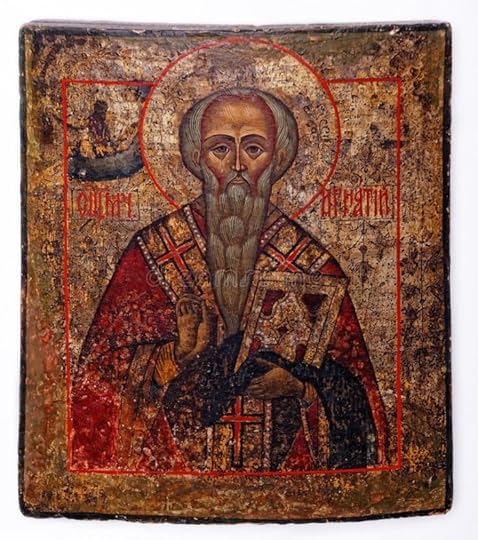 Ignatius of Antioch icon
Ignatius of Antioch iconSeven Catholic Quotes Of St. Ignatius Of Antioch
1. Take note of those who hold heterodox opinions on the grace of Jesus Christ, which has come to us, and see how contrary their opinions are to the mind of God. . . . [7, 2] They abstain from the Eucharist and from prayer, because they do not confess that the Eucharist is the Flesh of our Savior Jesus Christ, Flesh which suffered for our sins and which the Father, in His goodness, raised up again. They who deny the gift of God are perishing in their disputes.- Chapter 6, Letter to the Smyrnaeans
2. See that you all follow the bishop, even as Jesus Christ does the Father, and the presbytery as you would the apostles; and reverence the deacons, as being the institution of God. Let no man do anything connected with the Church without the bishop. Let that be deemed a proper Eucharist, which is administered either by the bishop, or by one to whom he has entrusted it. Wherever the bishop shall appear, there let the multitude of the people also be; even as wherever Jesus Christ is, there is the Catholic Church.- Chapter 8, Letter to the Smyrnaeans
3. Ignatius, also called Theophorus, to the Church that has found mercy in the greatness of the Most High Father and in Jesus Christ, his only son; to the Church beloved and enlightened after the love of Jesus Christ, our God, by the will of him that has willed everything which is; to the Church wich also holds the presidency in the place of the country of the Romans, worthy of God, worthy of honor, worthy of blessing, worthy of praise, worthy of success, worthy of sanctification, and because you hold the presidency of love, named after Christ and named after the Father; here therefore do I salute in the name of Jesus Christ, the Son of the Father. -Introduction, Letter to the Romans
4. Let that be deemed a proper Eucharist, which is administered either by the bishop, or by one to whom he has entrusted it. -Chapter 8, Letter to the Smyrnaeans
5. Those indeed, who belong to God and to Jesus Christ–they are with the bishop. And those who repent and come to the unity of the Church–they too shall be of God. . . Do not err my brethren: if anyone follow a schismatic, he will not inherit the Kingdom of God. . . . Take care, then, to use one Eucharist, so that whatever you do, you do according to God: for there is one Flesh of our Lord Jesus Christ, and one cup in the union of His Blood; one altar as there is one bishop with the presbytery and my fellow servants, the deacons. -Chapter 3, Letter to the Philadelphians
6. In like manner let everyone respect the deacons as they would respect Jesus Christ, and just as they respect the bishop as a type of the Father, and the presbyters [priests] as the council of God and college of Apostles. Without these, it cannot be called a Church. -Chapter 2, Letter to the Trallians
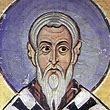
7. Indeed, when you submit to the bishop as you would to Jesus Christ, it is clear to me that you are living not in the manner of men but as Jesus Christ, who died for us, that through faith in His death you might escape dying. It is necessary, therefore,–and such is your practice,–that you do nothing without the bishop, and that you be subject also to the presbytery, as to the Apostles of Jesus Christ our hope, in whom we shall be found, if we live in Him. -Chapter 13, Letter to the Magnesians
On my weekly radio program with Deeper Truth Radio I did a whole show about what we can learn from St. Ignatius of Antioch. The pieces given in this article just scratch the surface of what we can learn from this great saint. If you wish to listen you can do so here.
The post Ignatius of Antioch: 7 Pivotal Quotes From The Great Saint appeared first on William Hemsworth.
William Hemsworth's Blog
- William Hemsworth's profile
- 7 followers



